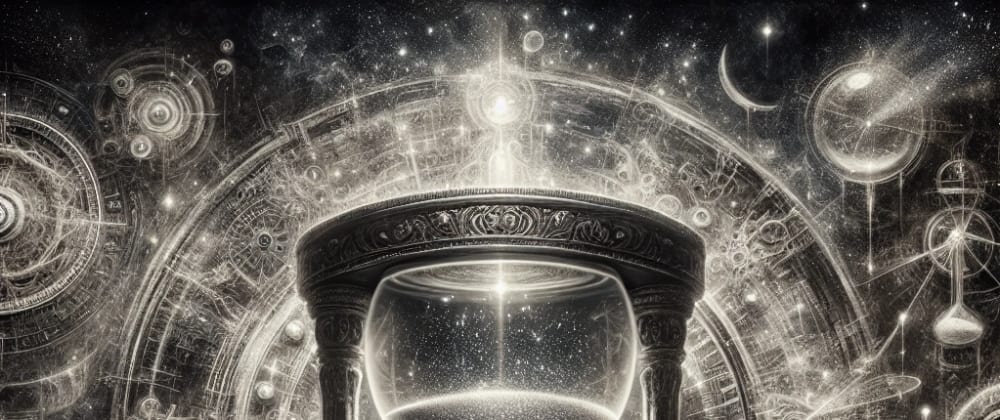🕰️ The Essence of Time: A Fundamental Dimension
Time, a concept so deeply ingrained in our lives, is often taken for granted. We use the word "time" to describe both the fundamental dimension that underlies our reality and the societal construct we use to measure and organize our daily experiences. However, to truly understand the nature of time and its role in shaping our universe, we must distinguish between these two aspects and introduce new vocabulary to capture their essence.
⏳ The Flow of Time: Introducing "Chronos"
In physics, time is considered a fundamental dimension, alongside the three spatial dimensions of length, width, and height. This aspect of time, which we propose to call "chronos," represents the continuous, unidirectional flow of events from the past, through the present, and into the future. Chronos is the canvas upon which the universe unfolds, the stage where the dance of matter and energy takes place.
At the most basic level, chronos is intimately linked to the concept of causality. The arrow of time, pointing from the past to the future, defines the sequence of cause and effect. Events in the past influence the present, which in turn shapes the future. This unidirectional nature of chronos is a consequence of the second law of thermodynamics, which states that the entropy of an isolated system always increases over time.
However, the flow of chronos is not as straightforward as it seems. Einstein's theory of relativity reveals that time is not an absolute, universal constant but rather a relative experience that depends on the observer's frame of reference. As objects approach the speed of light, time dilates, slowing down relative to a stationary observer. Moreover, the presence of massive objects can warp the fabric of spacetime, creating gravitational distortions that alter the flow of chronos.
🕑 The Measure of Time: Introducing "Kairos"
In contrast to the fundamental dimension of chronos, we have the societal construct of time, which we propose to call "kairos." Kairos represents the way we measure, organize, and experience time in our daily lives. It encompasses the units we use to quantify time, such as seconds, minutes, hours, days, and years, as well as the devices we employ to track its passage, such as clocks and calendars.
Kairos is a human invention, born out of the need to coordinate activities, schedule events, and maintain a shared sense of temporal order. It is the time we refer to when we speak of "lunchtime," "bedtime," or "meeting time." Kairos is the time that governs our routines, dictates our deadlines, and structures our social interactions.
While kairos is based on the underlying flow of chronos, it is a discrete, quantized representation of time. We divide the continuous expanse of chronos into manageable units, creating a framework for measuring and organizing our experiences. However, this quantization of time is a human construct and does not necessarily reflect the true nature of chronos.
🌌 The Interplay of Chronos and Kairos
The relationship between chronos and kairos is complex and multifaceted. Chronos represents the fundamental, continuous flow of time, while kairos is the discrete, measured experience of time in our lives. Kairos is a tool we use to navigate and make sense of the unrelenting current of chronos.
However, our perception of kairos can sometimes obscure the true nature of chronos. We tend to think of time as a linear, uniform progression, neatly divided into equal intervals. But the reality of chronos is far more complex. The relative nature of time, as revealed by Einstein's relativity, means that the flow of chronos can vary depending on the observer's frame of reference. Two events that appear simultaneous to one observer may occur at different times for another.
Moreover, the quantum nature of reality suggests that, at the most fundamental level, chronos may not be a smooth, continuous flow but rather a granular, discrete entity. The concept of Planck time, the smallest possible unit of time, implies that chronos may have a minimum resolution, a quantum limit beyond which the notion of time loses its meaning.
📚 The Power of Language: Redefining Time
The introduction of the terms "chronos" and "kairos" is more than just a linguistic exercise. By distinguishing between the fundamental dimension of time and our societal construct of it, we can better understand the nature of reality and our place within it. The new vocabulary allows us to communicate more precisely about the various aspects of time and fosters a deeper appreciation for the complexity of this essential concept.
Moreover, the act of naming and defining these aspects of time has the power to shape our perception and understanding of the world around us. Language is not merely a passive reflection of reality but an active participant in its construction. By introducing new words and concepts, we can expand our cognitive horizons and challenge our preconceived notions about the nature of time and existence.
⏰ Conclusion
Time, in its essence, is a multifaceted and enigmatic concept. By distinguishing between the fundamental flow of chronos and the societal measure of kairos, we can begin to unravel the mysteries of this essential dimension. The introduction of new vocabulary, such as "chronos" for the continuous flow of time and "kairos" for the discrete, measured experience of time, allows us to communicate more precisely about the nature of reality.
As we continue to explore the intricacies of time, both through scientific inquiry and philosophical contemplation, let us embrace the power of language to shape our understanding. By redefining time and introducing new words to capture its essence, we can expand our minds, challenge our assumptions, and gain a deeper appreciation for the complex tapestry of existence.
In the end, time remains an elusive and awe-inspiring concept, inviting us to ponder the very nature of reality. As we navigate the currents of chronos and the measures of kairos, let us remember that our perception of time is but a small window into the vast expanse of the universe. By embracing new words and new ways of thinking, we can begin to unravel the mysteries of time and our place within its eternal flow.







Top comments (0)